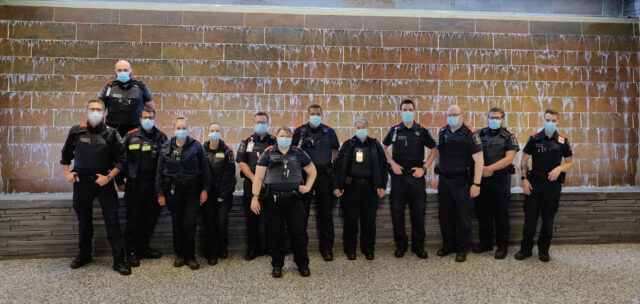FB bargaining team tables wages in negotiations
Every day, PSAC-CIU members in the FB group put their lives on the line to protect Canadians; safeguarding our borders, inspecting dangerous goods, and screening travelers for COVID-19 from coast to coast.
Throughout this round of negotiations, the PSAC-CIU bargaining team emphasized that members deserve a contract that recognizes their incredible dedication and brings them fully in line with law enforcement agencies across Canada.
All of the FB team’s bargaining proposals reflect this, from pension reform, paid time for firearms practice and reimbursement for firing range fees to paid meal periods and a plain clothes allowance for the Intelligence, Inland Enforcement and Criminal Investigations community.
During bargaining October 19-23, the team put forward a wage proposal that reflects the need for parity with the broader law enforcement community.
Wage proposals in line with national average
PSAC conducted a survey of wage rates at major law enforcement agencies across Canada, including provincial police (OPP, Sûreté du Québec and the Newfoundland Constabulary) and large municipal police forces (Toronto, Montreal, Peel Region and Vancouver). Our wage demands provide for fair annual increases and a market adjustment that would close the gap between FB members and the national average for law enforcement personnel.
Need to address discipline, grievance policy
The team have also made proposals to fix rampant discipline problems at Canada Border Services Agency (CBSA). The team made it clear this past week that they do not trust CBSA management. New protections for union members are needed. They also raised issues with the grievance procedure and the fact that the process is lengthy and inefficient. CBSA has implemented unreasonable changes to its repayment policy when employees are erroneously overpaid. The team has proposed to fix these problems.
Lastly, the bargaining team raised problems related to access to leave with income averaging and telework that need to be addressed.
No concessions
CBSA is proposing to remove the 7-day shift change notice and replace it with 48 hours’ notice, consistent with the CX agreement. The bargaining team informed management that the Confédération des syndicats nationaux (CSN) and the CXs may have agreed to this, but our union will not.
Management is also proposing concessions in the context of discipline and our variable shift schedule arrangements. The team informed the employer that, while we are prepared to bargain fairly, they are interested in improvements at CBSA, not concessions.
Upcoming bargaining dates
PSAC-CIU is in the process of setting dates to return to the table with the employer in November. The expectation is that management will return to the table prepared to address these issues in a meaningful way.
Through membership solidarity and perseverance, PSAC-CIU can achieve these objectives in this round of negotiations. We have made groundbreaking gains for FB members in the past. We will do so again.
To review the package of proposals that we tabled as well as those of the employer, visit PSAC’s FB page. We’ll announce new bargaining dates when they’re available and continue to provide updates throughout the bargaining process.
Please be sure to speak with your CIU branch president if you have any questions.
The original version of this article was first posted on the PSAC website.[








